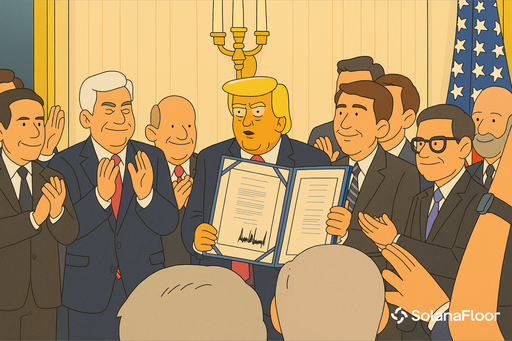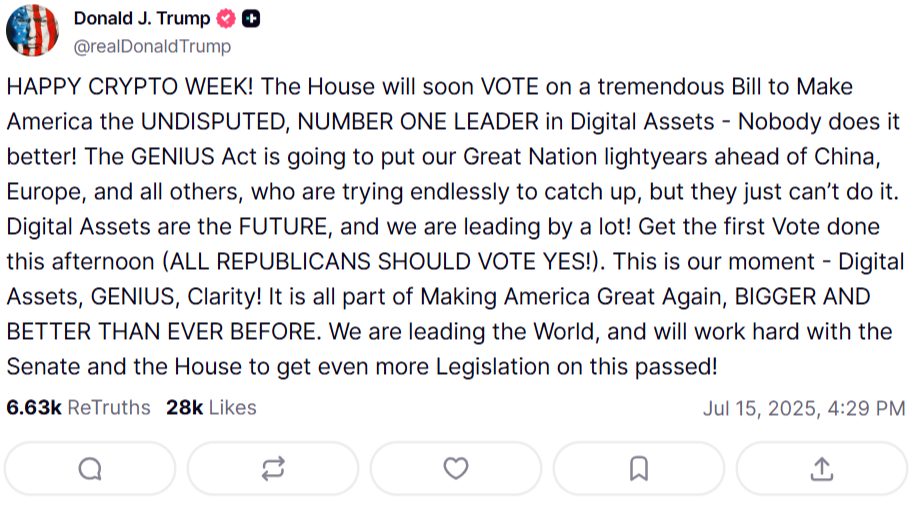
Congress’s Crypto Week: What the GENIUS and CLARITY Acts Mean for Digital Assets and Solana
The House of Representatives passed three significant crypto bills after a record-breaking 10-hour vote and bipartisan negotiations, paving the way for regulatory clarity and boosting blockchain innovation within the U.S.
- Published:
- Edited:
Earlier this month, the House of Representatives announced that the week of July 14th would be ‘Crypto Week,’ during which it would deliberate on a series of bills aimed at strengthening digital asset regulation.
President Trump declared “HAPPY CRYPTO WEEK!” in a Tuesday post on Truth Social, describing digital assets as the future.

After a record‑breaking 10‑hour procedural vote, the U.S. House of Representatives capped a dramatic “Crypto Week” by approving three landmark digital asset bills on Thursday, July 17, 2025. Strong bipartisan support led to the passage of three measures: one to regulate stablecoins, another to clarify crypto market rules, and a third to block a U.S. central bank digital currency (CBDC). The key bills passed by the House are:
-
GENIUS Act (stablecoins): Requires issuers to hold fully-backed U.S. dollar reserves (or similarly liquid assets) and subjects large issuers (over $10B tokens) to federal oversight and annual audits. The House passed the bill in a 308‑122 vote.
-
CLARITY Act (market structure): Sets clear definitions (e.g., “digital commodity” vs security) and divides authority between the CFTC and SEC based on how tokens are used. The House passed the bill in a 294‑134 vote.
-
Anti-CBDC Act: Bars creation of a U.S. government digital currency. Passed House 219‑210, and is expected to attach to the 2026 Defense Authorization bill.
The GENIUS Act now goes to President Trump’s desk, making it the first major U.S. crypto regulation enacted by Congress.
Historic Vote Drives Crypto Policy Forward
After late-night disputes in the House Freedom Caucus earlier in the week, lawmakers moved swiftly to pass the crypto bills in succession. By Thursday evening, the GENIUS Act cleared the House in a 308‑122 vote, and the CLARITY Act passed 294‑134. A handful of Democrats joined nearly all Republicans in backing each measure, making the outcome unusually bipartisan.
Congressional leaders quickly agreed that the Anti-CBDC ban would be included in the must-pass defense bill in the Senate after Republican holdouts forced an extra debate.
GENIUS Act and Stablecoins
The Guiding and Establishing National Innovation for U.S. Stablecoins (GENIUS) Act imposes the first-ever federal framework for payment stablecoins. It mandates that issuers back each token with liquid, government-backed assets (like U.S. dollars or Treasuries) and imposes tougher audits on large issuers. The Senate had already approved GENIUS by a 68‑30 vote in June.
By passing it now, the House fulfilled President Trump’s request to enact stablecoin rules by summer. The White House immediately scheduled a signing ceremony for the bill on Friday, completing one of its promised crypto regulatory milestones.
The act creates certainty for companies to integrate crypto into payment systems. Solana Policy Institute President Kristin Smith told reporters that with this framework, “traditional finance, traditional payments companies” can now adopt stablecoins as they upgrade infrastructure. She noted that banks and payments networks are already interested in stablecoin solutions, and that implementing the law opens the door for those markets.
CLARITY Act and Market Structure
The Digital Asset Market CLARITY Act aims to resolve the SEC vs. CFTC confusion by defining digital assets and assigning regulatory oversight based on their use. It explicitly labels chains as “mature” or “sufficiently decentralized” if no single party controls them. Mature networks (like Solana, Ethereum, and others) would be treated as commodity platforms under CFTC oversight, while tokens sold as investments remain with the SEC.
Exchanges and brokers handling digital commodities must register with the CFTC, and token issuers can raise up to $75 million per year without SEC registration if they plan to decentralize within a year. The act also enshrines self-custody rights, enabling Americans to hold cryptocurrency in their own wallets without relying on a bank intermediary.
By codifying definitions (for example, “blockchain”, “digital asset”, “digital commodity”) and jurisdiction, the CLARITY Act promises a predictable compliance environment. Supporters argue this encourages innovation, with fewer regulatory surprises for crypto companies and clearer standards for investors. However, some critics fear it weakens SEC oversight. For now, the bill heads to the Senate.
Solana’s Advantage: Fast Rails, Policy Wins, and Institutional Momentum
The new U.S. crypto rules intersect in important ways with Solana’s ecosystem. For example, the CLARITY Act’s definition of decentralization helps fast chains like Solana. By classifying sufficiently decentralized blockchains as commodities, the bill would keep those tokens under CFTC rules rather than more stringent securities laws. Solana advocates argue that this can reduce compliance burdens for innovative protocols.
Solana Policy Institute President Kristin Smith notes the historic House votes show crypto’s broad appeal. She commented, “The CLARITY Act is also incredibly important. That now moves on to the Senate. But I think what's really remarkable, and I was actually up in the Capitol, up in the gallery watching the votes earlier today, is both of these votes got a tremendous amount of bipartisan support. The CLARITY Act had 294 positive votes, and there were 308 for the Genius Act. So this is about as bipartisan as an issue gets, and I think it shows that Americans love crypto.”
A Maturing Asset Class
Crypto’s integration into U.S. retirement plans has also gained traction, underscoring its maturing status. In May 2025, the Department of Labor rescinded guidance from the Biden era that had discouraged Bitcoin and other digital assets in 401(k) plans.
Additionally, President Trump is expected to sign an executive order that would permit 401(k) retirement plans to invest in crypto. This shift effectively allows employers to offer cryptocurrencies alongside stocks and bonds in retirement accounts.
Major investment firms are making significant investments to meet demand. Reports indicate that Blackstone, Apollo, BlackRock, and other firms are preparing crypto ETFs and private funds suitable for 401(k) plans.
The change could gradually open trillions in retirement savings to crypto holdings. Taken together with new laws, these developments signal that cryptocurrencies are being increasingly treated as mainstream financial assets.
With House passage complete, all eyes now turn to the Senate. Lawmakers in both chambers hope to enact the crypto market-structure and stablecoin laws in tandem.
Meanwhile, the President is poised to sign the GENIUS Act immediately. The White House and the crypto industry celebrated the bill’s arrival and scheduled a signing ceremony for 2:30 p.m. on July 18.
If enacted as planned, these measures will reshape U.S. crypto markets, defining regulatory roles, promoting innovation-friendly rules, and giving platforms like Solana a stronger framework to operate under. The House’s sweeping votes make July 2025 a turning point for digital assets; the outcomes in the Senate and how regulators implement the laws will determine their ultimate impact.
Read More on SolanaFloor
Solana DePIN Cracks $3M Revenue in 2025 - Is Solana the New Home of DePIN?
U.S Senate Passes GENIUS Act For Regulation of Stablecoins
A Flurry of Activity as “Crypto Week” Kicks of in D.C


